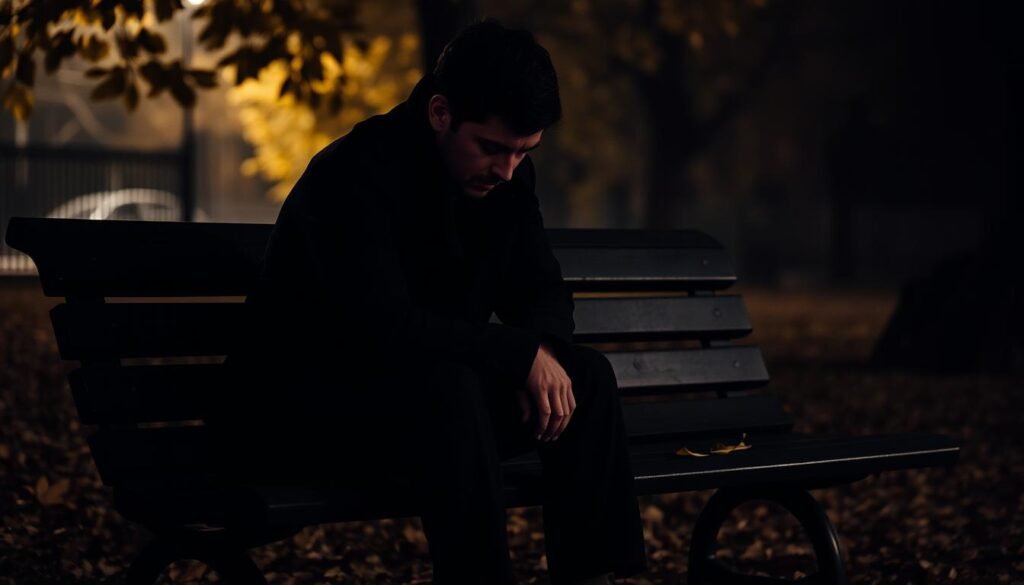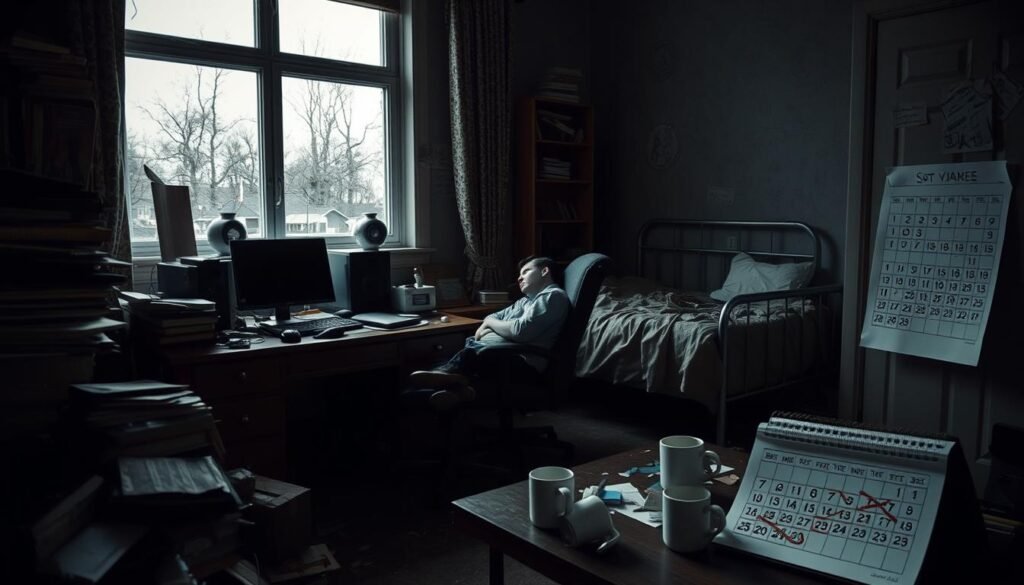Have you ever thought that signs of depression in men might be hidden? They can be buried under normal looks and routines. Society often misses these signs as it tells men not to show feelings. The National Alliance of Mental Illness says only 1 in 16 men admit to feeling depressed. Yet, the true number could be higher. Men often show depression through anger or irritability. Because of this, doctors often miss about 80% of these cases.
This article will help you understand depression in men by looking at the main warning signs. Knowing these can help start the treatment early. Treatments like cognitive behavioral therapy (CBT) and new medicines can help a lot. Recognizing depression signs in men is the first step towards healing.
Key Takeaways
- Depression is often underreported in men, with a significant number opting to suffer in silence.
- Common symptoms include irritability, anger, and physical complaints rather than sadness.
- Societal norms can inhibit open discussion of mental health among men.
- Effective treatments like CBT and ECT can lead to substantial improvement in symptoms.
- Recognizing key signs early can facilitate timely diagnosis and treatment.
- Many men avoid seeking help, leading to a lack of diagnosis and support.
Understanding Depression in Men
Depression in men shows up differently than in women. It’s key to know these unique signs. Men often hide their feelings, focusing on physical complaints instead. This makes it harder to diagnose and treat them.
When dealing with male mental health issues, men use different coping methods. They might not report feeling sad or hopeless for a long time. Many also suffer from tiredness and problems sleeping without linking these to depression.
Using substances like alcohol or drugs can make things worse. These are ways men might try to handle their depression on their own. But such habits might not be seen as signs of depression. This can delay the help they need.
Suicide rates among men raise big concerns. They often choose more deadly ways to attempt suicide and might act quickly. We need to help men talk about mental health and know their options.
To treat depression, therapy, medications, and methods like mindfulness have success. Learning how to cope and manage stress can change lives. Understanding depression fully can help end the stigma. It can encourage seeking out help.
Anyone struggling can find resources at the National Institute of Mental Health. Also, the 988 Suicide & Crisis Lifeline is there for immediate support.
Common Signs of Male Depression
Men show depression differently. A common sign is irritability. Instead of feeling sad, men often feel angry. This can cause misunderstandings. Feeling hopeless and frustrated is also common. These emotional changes often lead to different behaviors.
Withdrawing socially is another sign. Men might stop doing things they love or hanging out with friends. This can make them feel alone. It can hurt their relationships and work life too.
Don’t ignore physical symptoms. Issues like trouble sleeping, feeling tired, and having pain are signs. These problems might make men see a doctor. But they often talk about physical health, not how they’re feeling inside. The Centers for Disease Control and Prevention say men might use drugs or alcohol to cope.
It’s important to know these signs. There’s a stigma about men talking about their feelings. Knowing about depression helps men and those close to them. It encourages open talks about mental health.

| Signs of Male Depression | Description |
|---|---|
| Irritability | Frequent anger rather than sadness. |
| Social Withdrawal | Disengagement from hobbies and social interactions. |
| Physical Symptoms | Chronic aches and fatigue, along with sleep changes. |
| Substance Use | Increased reliance on drugs and alcohol for coping. |
| Suicide Risk | Higher rates of completed suicides among men. |
Symptoms of Depression in Men
It can be hard to spot depression in men because it looks different from women’s depression. There are emotional and physical signs. Knowing both helps us understand how men are affected by depression.
Emotional Symptoms
Men’s emotional signs of depression don’t always match what we expect. Instead of just feeling sad, they might get angry or aggressive. Studies show men may feel:
- Feelings of worthlessness or hopelessness
- Increased irritability or anger
- Loss of interest in activities once enjoyed, including sexual activity
- Thoughts of self-harm or suicide
- Isolation from family and friends
These signs are often hidden by men. It’s crucial to notice these hints of deeper problems. You can find more info here.
Physical Symptoms
Depression’s physical symptoms in men are easier to see. They may complain about physical issues when they’re really feeling mental distress. This could lead them to get help for:
- Chronic fatigue
- Sleep disturbances, either insomnia or sleeping too much
- Changes in appetite and weight
- Increased physical pain or health issues
- Increased substance abuse as a coping mechanism
Understanding both emotional and physical signs is key. Recognizing these symptoms helps families and doctors support men with depression.
| Type of Symptom | Examples |
|---|---|
| Emotional Symptoms | Anger, irritability, feelings of worthlessness |
| Physical Symptoms | Fatigue, sleep disturbances, chronic pain |
Impact of Societal Norms on Male Mental Health
Societal norms greatly affect how men deal with mental health, especially depression. Many feel pressured to act tough and not show weakness. This can lead to feeling alone and not getting needed help. About 9% of men feel anxious or depressed daily, but only 41% seek help.
Stigma around mental health stops many men from reaching out. This is especially true for younger men, men of color, and those with less money. Society’s push for men to be emotionally strong makes it hard for them to admit they’re struggling. The American Psychological Association says ignoring depression signs is dangerous. It shows how societal views influence men’s mental health.
The effects of sticking to these norms can be very harmful. Studies find that men who try to live up to these standards face more depression and anxiety. Suicide rates are much higher in men, 3.6 times more than women. This is the second top cause of death for men between 10–34 years old. These facts underline the need to change how society views male mental health.

To fight this stigma, society needs to become more accepting. Highlighting the benefits of seeking help could lead more men to get the care they need. The National Institutes of Health stress the need to overcome these help-seeking barriers. This can help make it easier for men to talk about their mental health issues.
Low Motivation in Men: A Hidden Sign
Low motivation in men is often a key sign of bigger issues, like depression. It may look like laziness but actually points to more serious problems. When men stop enjoying activities they used to love, it could be a sign of male depression.
This lack of drive can affect work and social life, making things worse emotionally.
Depression can lead to ongoing sadness and low self-worth. If it gets bad, it can mess with day-to-day life and happiness. Physical issues, like eating less and sleeping poorly, can also make motivation drop. This starts a hard-to-break cycle.
Understanding how serious low motivation is, is crucial. If it’s not dealt with, it can ruin relationships and work. Getting help after feeling down for more than two weeks is important. Looking into therapy and medication can help improve mental health. Knowing the signs of depression in men is the first step to getting better.
| Signs of Male Depression | Symptoms |
|---|---|
| Low Motivation | Withdrawal from activities, decreased interest in work and social life |
| Emotional Symptoms | Feelings of sadness, hopelessness, and low self-esteem |
| Physical Symptoms | Changes in appetite, fatigue, and disturbed sleep patterns |
| Negative Behaviors | Increased use of substances, irritability, and anger |

Interpreting Mood Changes in Men
Mood changes in men can hint at deeper mental health issues, like depression. Irritability and fatigue are key signs of these shifts. Spotting these signs early can help with better treatment and health.
Irritability as a Warning Flag
When men’s moods change, they often show irritability. This might look like getting upset easily over small things. It usually points to hidden sadness or frustration, not just current stress. Knowing this helps us support men facing these challenges.
Fatigue and Its Relation to Depression
Fatigue in men often links to depression. It can really affect their day-to-day life and feelings. Even with enough sleep, this tiredness can stick around. Seeing fatigue as a symptom lets men get help early, improving their situation.
Lack of Interest in Activities
A major sign of male depression is losing interest in favorite activities. This can show up in many ways. Men might skip out on events with friends, stop doing hobbies, or not care about work like they used to. Because of this, their relationships might get worse. This can make them and their loved ones feel isolated and upset.
It’s important for family and friends to notice these signs of depression in men. Knowing about these changes helps start conversations about mental health. Talking about these signs can make a support system stronger. Helping early is key. Waiting too long might mean the depression gets worse.
The effects of this symptom are serious. Staying away from activities they once loved can make a person feel even more alone. It can lead to feeling very down and hopeless. Paying attention to these warning signs is very important. It can even save lives, especially since many men sadly choose suicide.
Risk Factors for Depression in Guys
Understanding depression’s risk factors in guys is key to helping early on. Many things add to these risks, like family health history and what’s happening in someone’s life. If depression is common in your family, you might be more likely to face it, too.
Big life stresses can also make things tough. Losing a job, having trouble in relationships, or dealing with trauma can trigger depression. It’s important to know these signs so we can tackle them early.
Family History and Personal Circumstances
Family history plays a big role when it comes to depression. If your family has faced it, it’s likely you might too. Plus, dealing with constant stress can change how your body and mind work. This can lead the way to feeling very down.
Certain illnesses like thyroid problems, brain disorders, or having had a stroke also up the risk. For guys dealing with health issues plus stress, depression risk is higher.
The Role of Substance Abuse
Substance abuse deeply affects men’s mental health. When feeling down, some guys might use alcohol or drugs to try to feel better. This choice can make their depression worse.
Showed statistics reveal over half of workers who passed away from drug overdoses in British Columbia’s construction and transport jobs in 2023. This ties job stress tightly to substance abuse. Knowing these risks helps us spot depression signs early and get help. To learn more about depression in men, visit risk factors for depression in guys.